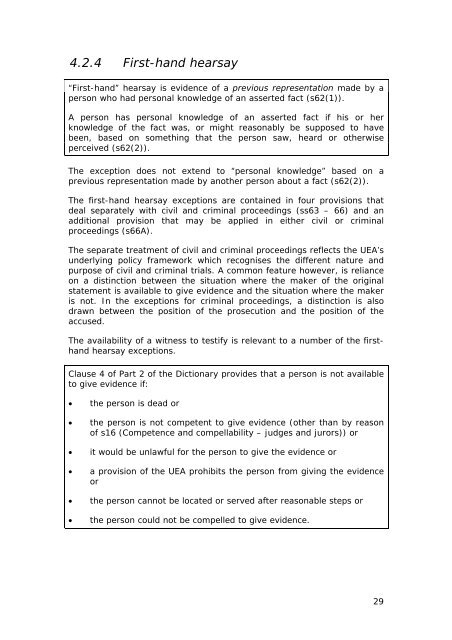Introduction to the UEA - Victorian Law Reform Commission
Introduction to the UEA - Victorian Law Reform Commission
Introduction to the UEA - Victorian Law Reform Commission
Create successful ePaper yourself
Turn your PDF publications into a flip-book with our unique Google optimized e-Paper software.
4.2.4 First-hand hearsay<br />
“First-hand” hearsay is evidence of a previous representation made by a<br />
person who had personal knowledge of an asserted fact (s62(1)).<br />
A person has personal knowledge of an asserted fact if his or her<br />
knowledge of <strong>the</strong> fact was, or might reasonably be supposed <strong>to</strong> have<br />
been, based on something that <strong>the</strong> person saw, heard or o<strong>the</strong>rwise<br />
perceived (s62(2)).<br />
The exception does not extend <strong>to</strong> “personal knowledge” based on a<br />
previous representation made by ano<strong>the</strong>r person about a fact (s62(2)).<br />
The first-hand hearsay exceptions are contained in four provisions that<br />
deal separately with civil and criminal proceedings (ss63 – 66) and an<br />
additional provision that may be applied in ei<strong>the</strong>r civil or criminal<br />
proceedings (s66A).<br />
The separate treatment of civil and criminal proceedings reflects <strong>the</strong> <strong>UEA</strong>’s<br />
underlying policy framework which recognises <strong>the</strong> different nature and<br />
purpose of civil and criminal trials. A common feature however, is reliance<br />
on a distinction between <strong>the</strong> situation where <strong>the</strong> maker of <strong>the</strong> original<br />
statement is available <strong>to</strong> give evidence and <strong>the</strong> situation where <strong>the</strong> maker<br />
is not. In <strong>the</strong> exceptions for criminal proceedings, a distinction is also<br />
drawn between <strong>the</strong> position of <strong>the</strong> prosecution and <strong>the</strong> position of <strong>the</strong><br />
accused.<br />
The availability of a witness <strong>to</strong> testify is relevant <strong>to</strong> a number of <strong>the</strong> firsthand<br />
hearsay exceptions.<br />
Clause 4 of Part 2 of <strong>the</strong> Dictionary provides that a person is not available<br />
<strong>to</strong> give evidence if:<br />
• <strong>the</strong> person is dead or<br />
• <strong>the</strong> person is not competent <strong>to</strong> give evidence (o<strong>the</strong>r than by reason<br />
of s16 (Competence and compellability – judges and jurors)) or<br />
• it would be unlawful for <strong>the</strong> person <strong>to</strong> give <strong>the</strong> evidence or<br />
• a provision of <strong>the</strong> <strong>UEA</strong> prohibits <strong>the</strong> person from giving <strong>the</strong> evidence<br />
or<br />
• <strong>the</strong> person cannot be located or served after reasonable steps or<br />
• <strong>the</strong> person could not be compelled <strong>to</strong> give evidence.<br />
29

















